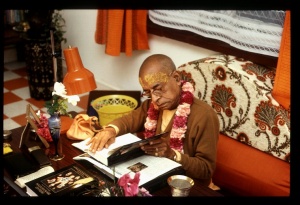SB 10.6.21: Difference between revisions
m (1 revision(s)) |
No edit summary |
||
| Line 1: | Line 1: | ||
{{info | {{info | ||
|speaker= | |speaker=Śukadeva Gosvāmī | ||
|listener=King | |listener=King Parīkṣit | ||
}} | }} | ||
[[Category:Srimad-Bhagavatam - Canto 10 Chapter 06]] | |||
[[Category:Bhagavatam Verses Spoken by Sukadeva Gosvami - Vanisource|100621]] | |||
<div style="float:left">'''[[Srimad-Bhagavatam]] - [[SB 10|Tenth Canto]] - [[SB 10.6: The Killing of the Demon Putana|Chapter 6: The Killing of the Demon Pūtanā]]'''</div> | |||
<div style="float:right">[[File:Go-previous.png|link=SB 10.6.20]] '''[[SB 10.6.20]] - [[SB 10.6.22-23]]''' [[File:Go-next.png|link=SB 10.6.22-23]]</div> | |||
{{RandomImage}} | |||
==== TEXT 21 ==== | ==== TEXT 21 ==== | ||
<div | <div class="verse"> | ||
gopyaḥ saṁspṛṣṭa-salilā | :gopyaḥ saṁspṛṣṭa-salilā | ||
aṅgeṣu karayoḥ pṛthak | :aṅgeṣu karayoḥ pṛthak | ||
nyasyātmany atha bālasya | :nyasyātmany atha bālasya | ||
bīja-nyāsam akurvata | :bīja-nyāsam akurvata | ||
</div> | </div> | ||
| Line 17: | Line 22: | ||
==== SYNONYMS ==== | ==== SYNONYMS ==== | ||
<div | <div class="synonyms"> | ||
''gopyaḥ''—the ''gopīs''; ''saṁspṛṣṭa-salilāḥ''—touching a cup of water and drinking; ''aṅgeṣu''—on their bodies; ''karayoḥ''—on their two hands; ''pṛthak''—separately; ''nyasya''—after placing the letters of the ''mantra''; ''ātmani''—on their own; ''atha''—then; ''bālasya''—of the child; ''bīja-nyāsam''—the process of ''mantra-nyāsa''; ''akurvata''—executed. | |||
</div> | </div> | ||
| Line 24: | Line 29: | ||
==== TRANSLATION ==== | ==== TRANSLATION ==== | ||
<div | <div class="translation"> | ||
The gopīs first executed the process of ācamana, drinking a sip of water from the right hand. They purified their bodies and hands with the nyāsa-mantra and then applied the same mantra upon the body of the child. | The gopīs first executed the process of ācamana, drinking a sip of water from the right hand. They purified their bodies and hands with the nyāsa-mantra and then applied the same mantra upon the body of the child. | ||
</div> | </div> | ||
| Line 31: | Line 36: | ||
==== PURPORT ==== | ==== PURPORT ==== | ||
<div | <div class="purport"> | ||
Nyāsa-mantra includes ācamana, or first drinking a sip of water kept in the right hand. There are different viṣṇu-mantras to purify the body. The gopīs, and in fact any householders, knew the process for being purified by chanting Vedic hymns. The gopīs executed this process first to purify themselves and then to purify the child Kṛṣṇa. One executes the process of aṅga-nyāsa and kara-nyāsa simply by drinking a little sip of water and chanting the mantra. The mantra is preceded with the first letter of the name, followed by anusvāra and the word namaḥ: oṁ namo 'jas tavāṅghrī avyāt, maṁ mano maṇimāṁs tava jānunī avyāt, and so on. By losing Indian culture, Indian householders have forgotten how to execute the aṅga-nyāsa and are simply busy in sense gratification, without any advanced knowledge of human civilization. | ''Nyāsa-mantra'' includes ''ācamana'', or first drinking a sip of water kept in the right hand. There are different ''viṣṇu-mantras'' to purify the body. The ''gopīs'', and in fact any householders, knew the process for being purified by chanting Vedic hymns. The ''gopīs'' executed this process first to purify themselves and then to purify the child Kṛṣṇa. One executes the process of ''aṅga-nyāsa'' and ''kara-nyāsa'' simply by drinking a little sip of water and chanting the ''mantra''. The ''mantra'' is preceded with the first letter of the name, followed by ''anusvāra'' and the word ''namaḥ: oṁ namo 'jas tavāṅghrī avyāt'', ''maṁ mano maṇimāṁs tava jānunī avyāt'', and so on. By losing Indian culture, Indian householders have forgotten how to execute the ''aṅga-nyāsa'' and are simply busy in sense gratification, without any advanced knowledge of human civilization. | ||
</div> | </div> | ||
__NOTOC__ | |||
<div style="float:right; clear:both;">[[File:Go-previous.png|link=SB 10.6.20]] '''[[SB 10.6.20]] - [[SB 10.6.22-23]]''' [[File:Go-next.png|link=SB 10.6.22-23]]</div> | |||
__NOTOC__ | |||
__NOEDITSECTION__ | |||
Revision as of 08:06, 19 May 2021

A.C. Bhaktivedanta Swami Prabhupada
TEXT 21
- gopyaḥ saṁspṛṣṭa-salilā
- aṅgeṣu karayoḥ pṛthak
- nyasyātmany atha bālasya
- bīja-nyāsam akurvata
SYNONYMS
gopyaḥ—the gopīs; saṁspṛṣṭa-salilāḥ—touching a cup of water and drinking; aṅgeṣu—on their bodies; karayoḥ—on their two hands; pṛthak—separately; nyasya—after placing the letters of the mantra; ātmani—on their own; atha—then; bālasya—of the child; bīja-nyāsam—the process of mantra-nyāsa; akurvata—executed.
TRANSLATION
The gopīs first executed the process of ācamana, drinking a sip of water from the right hand. They purified their bodies and hands with the nyāsa-mantra and then applied the same mantra upon the body of the child.
PURPORT
Nyāsa-mantra includes ācamana, or first drinking a sip of water kept in the right hand. There are different viṣṇu-mantras to purify the body. The gopīs, and in fact any householders, knew the process for being purified by chanting Vedic hymns. The gopīs executed this process first to purify themselves and then to purify the child Kṛṣṇa. One executes the process of aṅga-nyāsa and kara-nyāsa simply by drinking a little sip of water and chanting the mantra. The mantra is preceded with the first letter of the name, followed by anusvāra and the word namaḥ: oṁ namo 'jas tavāṅghrī avyāt, maṁ mano maṇimāṁs tava jānunī avyāt, and so on. By losing Indian culture, Indian householders have forgotten how to execute the aṅga-nyāsa and are simply busy in sense gratification, without any advanced knowledge of human civilization.